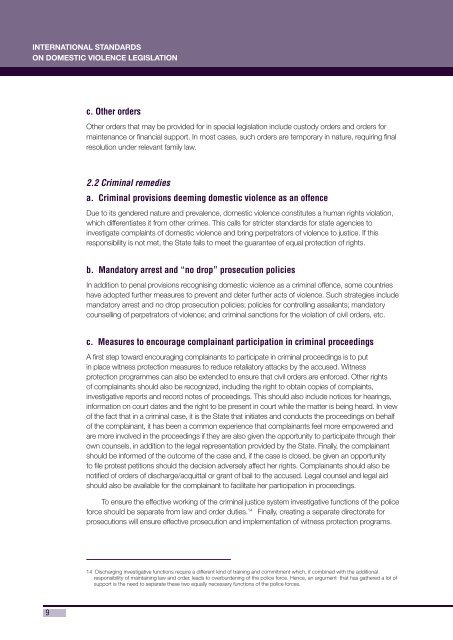Domestic Violence Legislation and its Implementation
Domestic Violence Legislation and its Implementation
Domestic Violence Legislation and its Implementation
You also want an ePaper? Increase the reach of your titles
YUMPU automatically turns print PDFs into web optimized ePapers that Google loves.
INTERNATIONAL STANDARDS<br />
ON DOMESTIC VIOLENCE LEGISLATION<br />
9<br />
c. Other orders<br />
Other orders that may be provided for in special legislation include custody orders <strong>and</strong> orders for<br />
maintenance or fi nancial support. In most cases, such orders are temporary in nature, requiring fi nal<br />
resolution under relevant family law.<br />
2.2 Criminal remedies<br />
a. Criminal provisions deeming domestic violence as an offence<br />
Due to <strong>its</strong> gendered nature <strong>and</strong> prevalence, domestic violence constitutes a human rights violation,<br />
which differentiates it from other crimes. This calls for stricter st<strong>and</strong>ards for state agencies to<br />
investigate complaints of domestic violence <strong>and</strong> bring perpetrators of violence to justice. If this<br />
responsibility is not met, the State fails to meet the guarantee of equal protection of rights.<br />
b. M<strong>and</strong>atory arrest <strong>and</strong> “no drop” prosecution policies<br />
In addition to penal provisions recognising domestic violence as a criminal offence, some countries<br />
have adopted further measures to prevent <strong>and</strong> deter further acts of violence. Such strategies include<br />
m<strong>and</strong>atory arrest <strong>and</strong> no drop prosecution policies; policies for controlling assailants; m<strong>and</strong>atory<br />
counselling of perpetrators of violence; <strong>and</strong> criminal sanctions for the violation of civil orders, etc.<br />
c. Measures to encourage complainant participation in criminal proceedings<br />
A fi rst step toward encouraging complainants to participate in criminal proceedings is to put<br />
in place witness protection measures to reduce retaliatory attacks by the accused. Witness<br />
protection programmes can also be extended to ensure that civil orders are enforced. Other rights<br />
of complainants should also be recognized, including the right to obtain copies of complaints,<br />
investigative reports <strong>and</strong> record notes of proceedings. This should also include notices for hearings,<br />
information on court dates <strong>and</strong> the right to be present in court while the matter is being heard. In view<br />
of the fact that in a criminal case, it is the State that initiates <strong>and</strong> conducts the proceedings on behalf<br />
of the complainant, it has been a common experience that complainants feel more empowered <strong>and</strong><br />
are more involved in the proceedings if they are also given the opportunity to participate through their<br />
own counsels, in addition to the legal representation provided by the State. Finally, the complainant<br />
should be informed of the outcome of the case <strong>and</strong>, if the case is closed, be given an opportunity<br />
to fi le protest petitions should the decision adversely affect her rights. Complainants should also be<br />
notifi ed of orders of discharge/acquittal or grant of bail to the accused. Legal counsel <strong>and</strong> legal aid<br />
should also be available for the complainant to facilitate her participation in proceedings.<br />
To ensure the effective working of the criminal justice system investigative functions of the police<br />
force should be separate from law <strong>and</strong> order duties. 14 Finally, creating a separate directorate for<br />
prosecutions will ensure effective prosecution <strong>and</strong> implementation of witness protection programs.<br />
14 Discharging investigative functions require a different kind of training <strong>and</strong> commitment which, if combined with the additional<br />
responsibility of maintaining law <strong>and</strong> order, leads to overburdening of the police force. Hence, an argument that has gathered a lot of<br />
support is the need to separate these two equally necessary functions of the police forces.

















